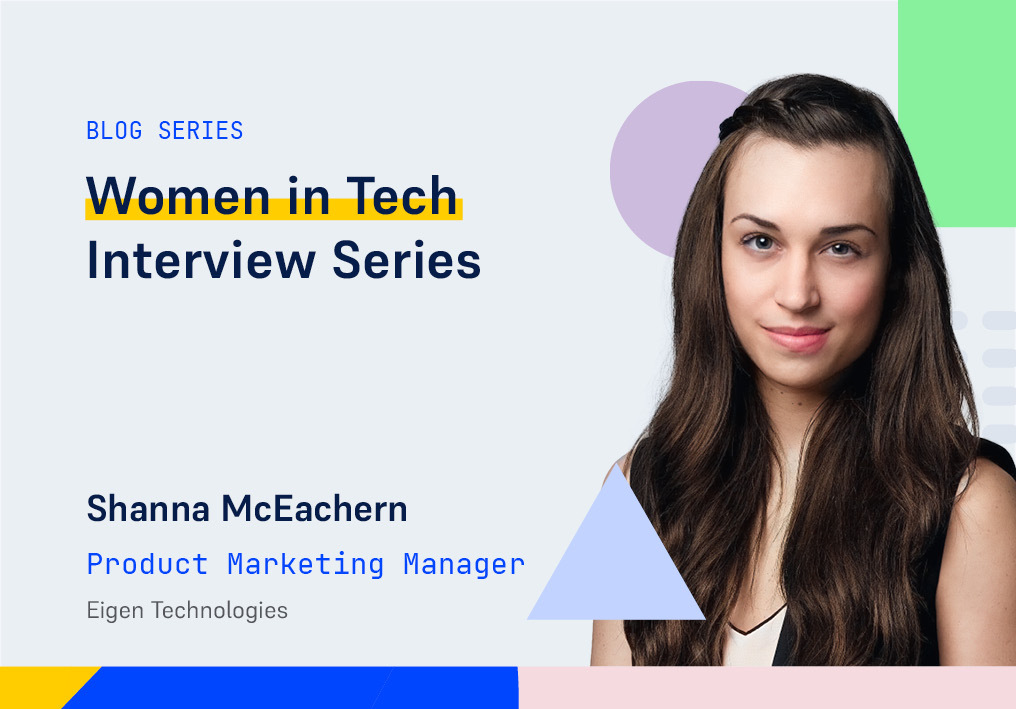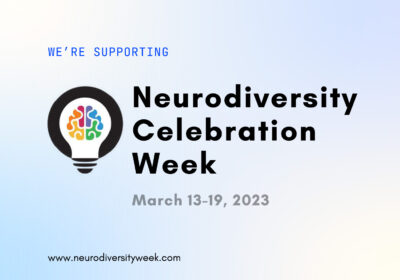Women in tech interview series: Instalment five with Eigen’s Product Marketing Manager, Shanna McEachern
Our Women in Tech interview blog series invites women, and those that champion them, to share their experiences and thoughts on gender diversity and inclusion more generally in the industry.
In this instalment, we talk to Shanna McEachern, our Product Marketing Manager here at Eigen.
1) Shanna, why did you choose a career in tech?
As my degree was in Neuroscience, I did not initially pursue a career in tech. Rather, I pursued a fast-paced career with collaboration at its core – one that would enable me to work cross-functionally with people of diverse backgrounds to build something new. As I sat alone in a windowless MRI laboratory in the final year of my schooling, I realized the path I was on might not evolve into the social ecosystem I was looking for.
I ended up graduating early to work in a global fintech company and I have found my calling in AI-driven B2B technology since then, compelled by the pace of the innovation and the lively ecosystem of start-ups, VCs and the teams who lead them.
2) Does the gender-gap in tech problem start in the classroom or in the boardroom?
There is a lot of research on this topic that suggests the gender gap – meaning, the underrepresentation of women in certain tech-oriented ecosystems – begins in the classroom. When I reflect on my personal upbringing, I would ask myself if that were true and I would agree the gap was prevalent in my life long before my working career and realised there was a gap before I entered grade school. Not only was I the only girl in my computer science and woodworking class, I was also the only girl at birthday parties, and my sister and I were the only girls at a basketball camp we went to. So that argument for me is the gender gap might form somewhere in that early childhood development phase.
“So why does that happen?” I think to myself. Again, it is a researched space, and I am sure that it is culturally driven gender norms that help shape those pathways, influenced by the expectations of parents and activities kids are exposed to at an early age. But in my experience, norms need not be the only route, and the defiance – or blissful ignorance – of norms on the part of my father is the reason I ended up the only girl in male-dominated environments. Growing up, my father suggested that being female should never limit me over my activities, interests, or career – and so I grew up believing gender did not matter. As one of the coaches at the local basketball camp, my father dropped my sister and I into a team of boys. As an avid camper, he taught us to catch snakes, build fires and drive a boat. As I got older, he encouraged me to start small businesses. While this encouragement landed me in many male-dominated rooms, it also made these situations a norm for me.
3) How can women help women develop within the industry?
I will tackle this from the perspective of a female founder, as I co-founded a supply chain tech company prior to joining Eigen as a product marketing manager (PMM). Statistics show only 20% of start-ups (roughly) have at least one female founder, and only 15% of venture capital partners are female. And yet, as a founder, I hardly noticed – likely because I had situated myself within both female micro-communities that became an important support system for me.
These communities were both organized (such as Female Founders or Women in Tech-type clubs) and organic (such as casual dinner gatherings), but all represented a similar ‘safe-haven’ in which being a female was regarded as no limitation. When you work, learn, and grow within these communities, it creates a mentorship and support system. They provide examples of women in leadership, both internally and through panel conversations that they would host and so forth. Growing within those communities, you do not feel the gendered limitation that you might have felt in that larger external world. As you develop confidence and freedom of expression, you take that confidence everywhere you go.
To help women, my recommendation is then to find a community, or build one if it does not exist. Create a world in which your gender is a source of opportunity - a reason for inclusion and confidence building – that will slowly permeate the world around it.
4) How can we avoid bias against women in tech?
Bias can present in many forms – and while overt discrimination against women is certainly in a better place today than it was in our history, I feel as though more subtle and potentially imperceptible gender-impact still exists.
Realistically, change is slow, and takes form through widespread shifts in culture. Should I encounter someone in the workplace with a subtle bias against women, it is unlikely to be worth my energy to try to change that on an individual level. Instead, I invest my energy in myself, operating under the belief that the best thing I can do for my personal success is to continue to represent my best self – and continue to lead by example.
That being said, I believe there is a vital role for management to play in reducing bias against women who work within the organizations they lead. That role begins with recognizing biases may occur – even within those organizations who strive to avoid them in their values - and designing systems for hiring, performance evaluations and promotions that depend on objective metrics. When we lessen the opportunity for subjective, qualitative evaluations, we lessen the wiggle room for bias and help bring fairness to the gender playing field. Some time ago, I read a Harvard Business Review article on the differences in male versus female perception in the workplace and a specific quote stood out to me: ‘distrust your instincts.’ In saying this, the author reminded us that our instincts are themselves bias – and finding a way to intentionally question them, particularly as a leader nurturing the talent beneath them, is a first step to gender parity.
5) Why Eigen?
For me, Eigen felt like the right place at the right time, but it was also attractive to me for several reasons. Eigen – and the specific PMM position I now hold – was a perfect match for my skillset and personal growth aspirations, and I do believe an employee/employer relationship need form a balanced give and take.
Eigen was looking for a self-starter who was comfortable shaping the product marketing function (new to the company) for the first time. As a former founder with product manager (PM) and PMM experience, I was a fit. Personally, I was looking for a growth-stage role within a strong and established team with whom I could collaborate – and while Eigen’s PMM function was new, its Marketing function was established. Through this collaboration, I am exposed to the talents of team members from whom I can learn, which I appreciate. I should also point out the management structure is attractive to me in this specific role because I have two strong female leaders positioned above me and both represent that female inclusive environment that I am keen to work in.
6) Any other closing thoughts you would like to share?
From my personal perspective, while I had the feeling ignorance was bliss, ignoring a problem is the not the best way to solve it. Continuing to believe yourself and demonstrate your capabilities, despite certain perceptions of the ecosystem you are in, is really the best thing that you can do to lead by example and continue to find your routes of success as a female. So that is the way that I like to operate!
If you would like to be part of the Women in tech conversation and would like to share your experiences and thoughts, please get in touch with us.

-
World Economic forum 2020
-
Gartner Cool Vendor 2020
-
AI 100 2021
-
Lazard T100
-
FT Intelligent Business 2019
-
FT Intelligent Business 2020
-
CogX Awards 2019
-
CogX Awards 2021
-
Ai BreakThrough Award 2022
-
CogX Awards Best AI Product in Insurance
-
FStech 2023 awards shortlisted
-
ISO27001
-
ISO22301
-
ISO27701
-
ISO27017
-
ISO27018


















